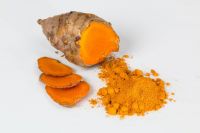
The researchers added varying amounts of turmeric oil to biopolymer films made from cassava starch, glycerol and carboxymethyl-cellulose. Different thicknesses of the films were coated onto brown packaging paper, which was then incubated with A. niger spores. The researchers found that the films were effective, with larger amounts of turmeric oil in thicker films being better at inhibiting fungal growth. The packaging samples were also soaked in water to simulate contact with food moisture. The researchers measured the amounts of antimicrobial compounds released from the film into the water using ultraviolet spectrometry. They found that more antimicrobial compounds were released from thicker films. However, the thickest films released antimicrobial compounds too slowly, and the thinnest ones released them too quickly, making them ineffective against microorganisms that take a long time to start growing. The researchers also tested the coated packaging's biodegradability by burying samples in soil that was exposed to rain and sun. They found that the packaging degraded more slowly as the turmeric oil content and film thickness increased, as the higher oil content kept soil microbes away. This continued up until the highest turmeric oil volumes, when degradation sped up again.






